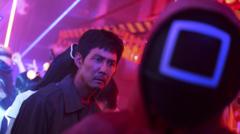As director Hwang Dong-hyuk embarks on the second season of Squid Game, he opens up about the immense pressures and financial struggles that have marked his journey, while offering a sneak peek into the thematic elements and character developments that fans can expect.
Behind the Scenes: Hwang Dong-hyuk's Transformation and Struggles While Filming Squid Game 2

Behind the Scenes: Hwang Dong-hyuk's Transformation and Struggles While Filming Squid Game 2
An exclusive look at the dramatic journey of Hwang Dong-hyuk as he navigates the pressures of creating the highly anticipated second season of Squid Game.
In the vibrant set of Squid Game 2, the acclaimed director Hwang Dong-hyuk reflects humorously about the toll filming the first series took on him, notably losing eight or nine teeth due to stress. The dystopian thriller captivated audiences worldwide when it was released in 2021, and now, as Hwang undertakes its sequel, he admits that he endured even greater anxiety to deliver a follow-up that meets soaring expectations.
Initially resistant to return for a second season, Hwang changed his mind primarily for financial reasons, confessing, “Even though the first series was such a huge global success, honestly I didn’t make much.” He has also been compelled by his desire to complete the narrative that he believes was only partially told in the initial installment.
The first season of Squid Game not only put South Korean dramas on the international map but also ignited conversations about pressing societal issues, particularly wealth disparity. As Hwang explains the heightened stress surrounding the production of the sequel, he acknowledges the darker societal climate. “New lines are being drawn. We’re in an era of us vs them,” he remarks, citing geopolitical conflicts and growing societal divisions.
Fans will see returning character Gi-hun, now seeking to dismantle the very games that captured his life, presumably facing challenges even more harrowing than before. In the latest twist, contestants will now face pivotal choices represented by contrasting symbols on their dormitory floor, hinting at deeper explorations of human conflict. Hwang aims to delve into the darker aspects of tribalism and its consequences.
Amidst the anticipation, Hwang expresses concern over the portrayal of violence in the series, emphasizing that it serves a purpose beyond mere shock value. He grapples with the overarching question of whether humanity possesses the will to steer away from chaos, contemplating the moral choices faced by characters as they navigate their turbulent environment.
Viewers can also expect to uncover more about the enigmatic Front Man through additional character backstories, shedding light on his motivations and relationships, which may not elicit sympathy but will offer insight into his actions. Lee Byung-hun, the actor portraying the Front Man, hints that understanding the character's past is crucial for comprehending his present decisions.
Despite the staggering success of the first season, Hwang revealed that he received a modest upfront payment from Netflix, contributing to a broader dialogue in South Korea regarding how streaming platforms compensate creators. Many industry professionals feel shortchanged by current models, with circumstances pushing creators to unionize and advocate for fairer systems.
As the December 2024 release date approaches, Hwang remains candid about his struggles and continual commitment to igniting industry discourse. With his teeth still hurting, he brings with him a wealth of challenges—personal and professional—surely crafting a narrative that resonates deeply with viewers while interrogating the very essence of societal structures through his groundbreaking series.
Initially resistant to return for a second season, Hwang changed his mind primarily for financial reasons, confessing, “Even though the first series was such a huge global success, honestly I didn’t make much.” He has also been compelled by his desire to complete the narrative that he believes was only partially told in the initial installment.
The first season of Squid Game not only put South Korean dramas on the international map but also ignited conversations about pressing societal issues, particularly wealth disparity. As Hwang explains the heightened stress surrounding the production of the sequel, he acknowledges the darker societal climate. “New lines are being drawn. We’re in an era of us vs them,” he remarks, citing geopolitical conflicts and growing societal divisions.
Fans will see returning character Gi-hun, now seeking to dismantle the very games that captured his life, presumably facing challenges even more harrowing than before. In the latest twist, contestants will now face pivotal choices represented by contrasting symbols on their dormitory floor, hinting at deeper explorations of human conflict. Hwang aims to delve into the darker aspects of tribalism and its consequences.
Amidst the anticipation, Hwang expresses concern over the portrayal of violence in the series, emphasizing that it serves a purpose beyond mere shock value. He grapples with the overarching question of whether humanity possesses the will to steer away from chaos, contemplating the moral choices faced by characters as they navigate their turbulent environment.
Viewers can also expect to uncover more about the enigmatic Front Man through additional character backstories, shedding light on his motivations and relationships, which may not elicit sympathy but will offer insight into his actions. Lee Byung-hun, the actor portraying the Front Man, hints that understanding the character's past is crucial for comprehending his present decisions.
Despite the staggering success of the first season, Hwang revealed that he received a modest upfront payment from Netflix, contributing to a broader dialogue in South Korea regarding how streaming platforms compensate creators. Many industry professionals feel shortchanged by current models, with circumstances pushing creators to unionize and advocate for fairer systems.
As the December 2024 release date approaches, Hwang remains candid about his struggles and continual commitment to igniting industry discourse. With his teeth still hurting, he brings with him a wealth of challenges—personal and professional—surely crafting a narrative that resonates deeply with viewers while interrogating the very essence of societal structures through his groundbreaking series.




















